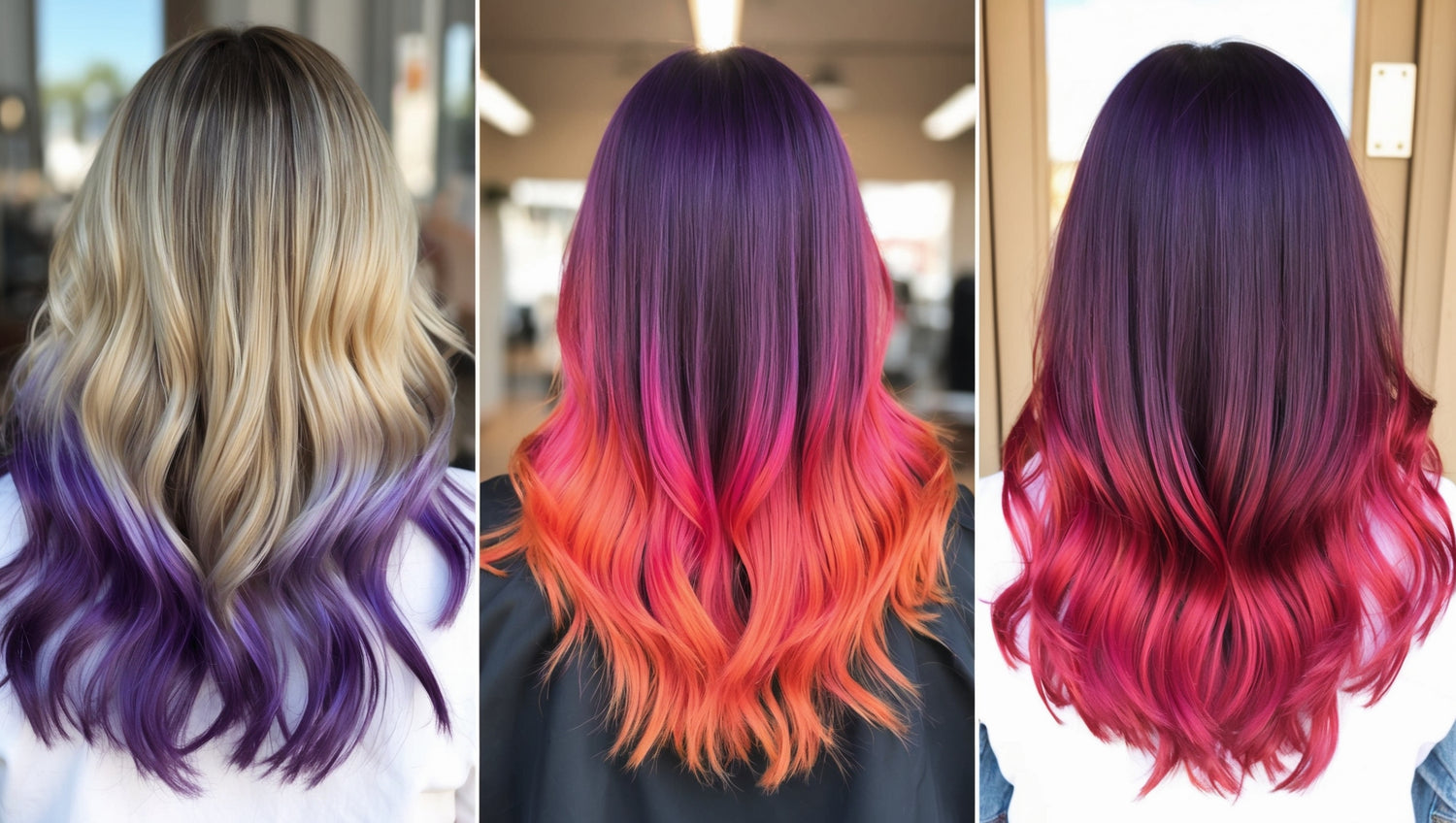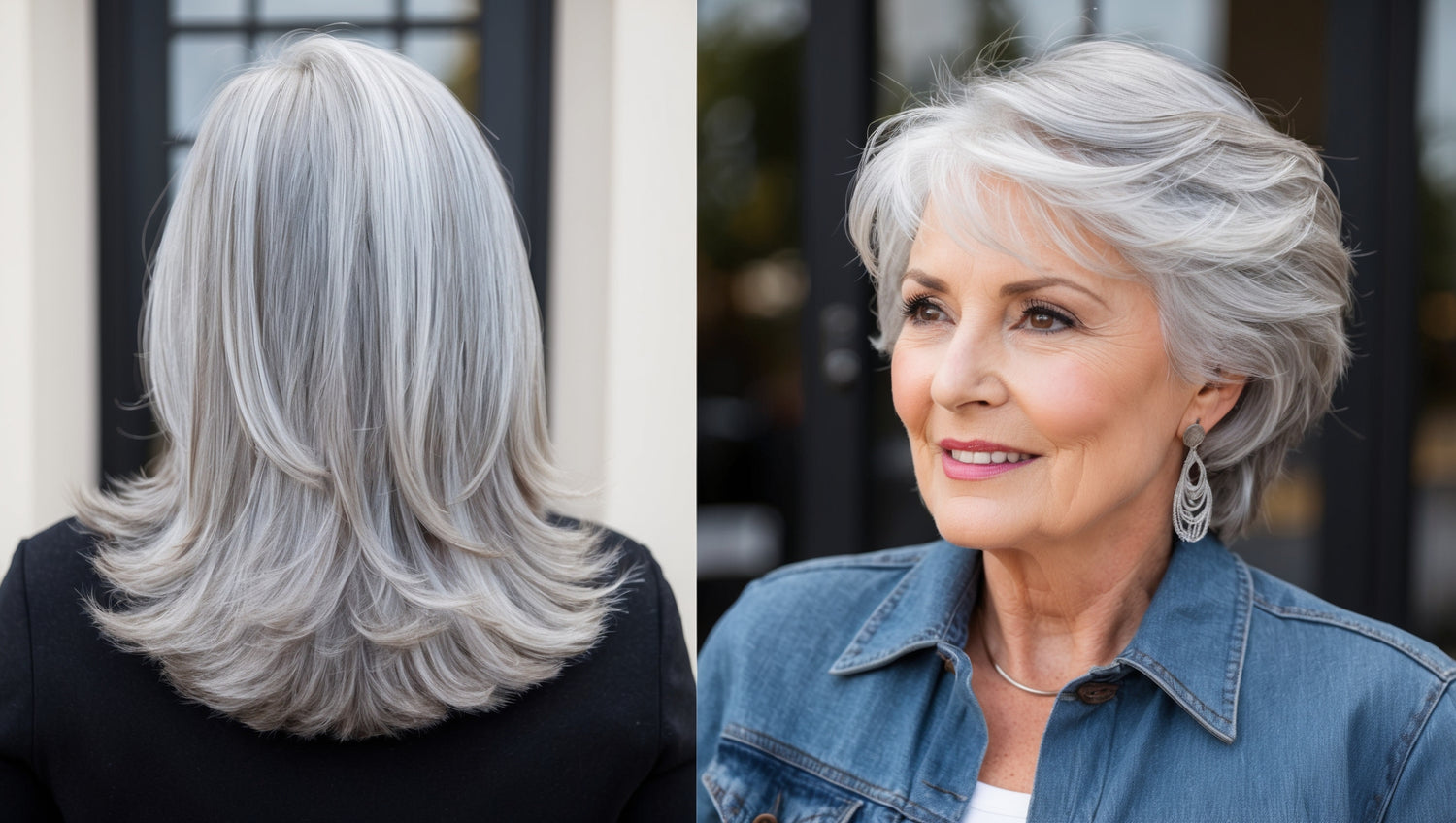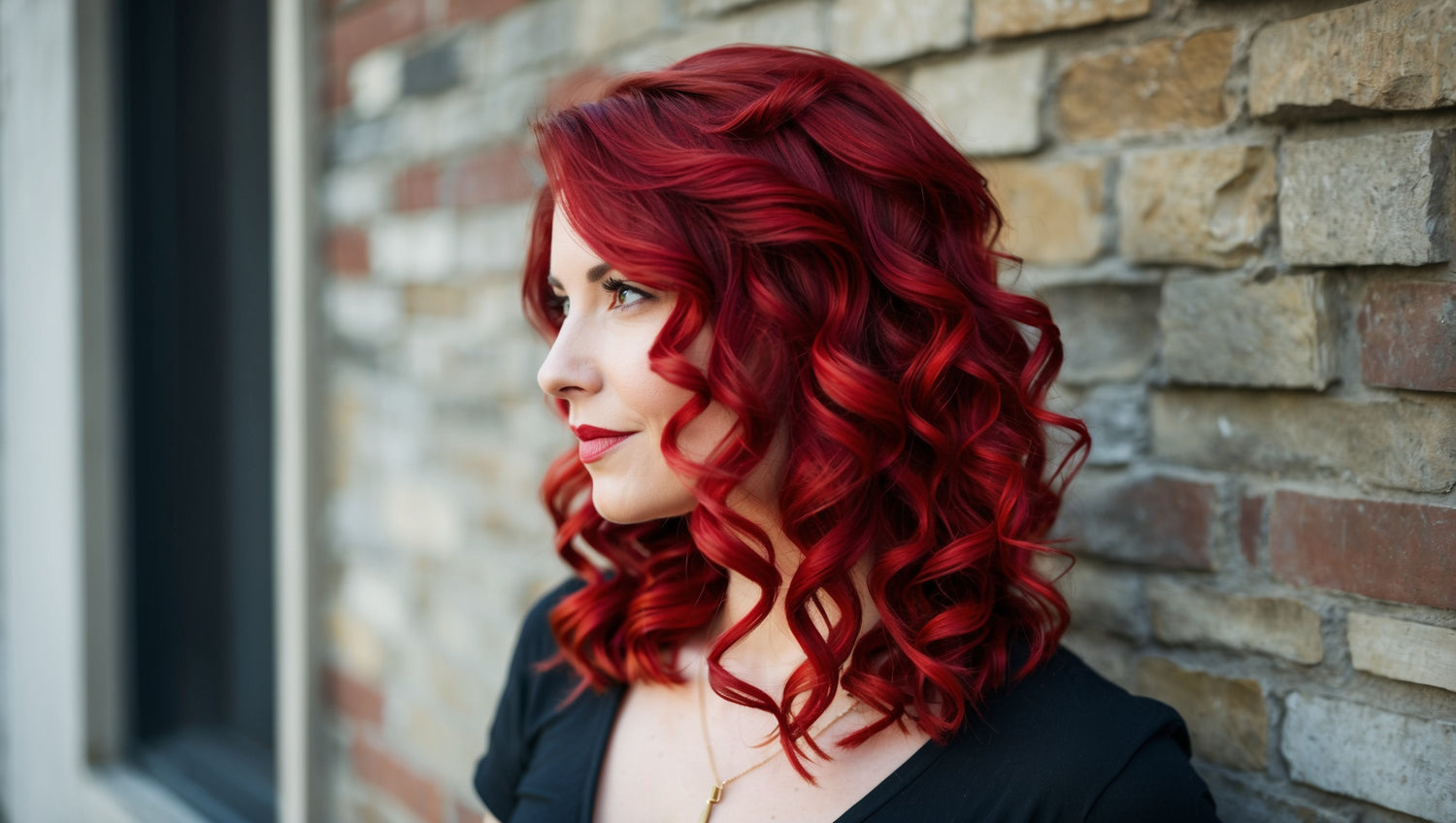Dandruff is actually harmless, but annoying. For many people, the white flakes are even embarrassing. Here we will look at why dandruff forms on the scalp and what helps against dandruff.
BACKGROUND INFORMATION ON DANDRUFF: WHAT IS DANDRUFF AND WHY DOES IT OCCUR?

Dandruff is caused by dead cells on the scalp that are shed too quickly and often clump together. The white clumps get caught in the hair or collect on the shoulders. Many sufferers find this unattractive or even embarrassing. The symptoms are sometimes accompanied by itching.
Although the harmless phenomenon is perceived as annoying and even embarrassing, dandruff is by no means rare. Around 50 percent of the population is affected by dandruff. Men develop dandruff more often than women.
Experts differentiate between dry dandruff and oily dandruff. Both types have different causes.
People who tend to have oilier hair and those suffering from certain diseases such as Parkinson's or HIV are at higher risk of dandruff.
Dandruff often first appears during puberty. However, dandruff can also develop later, as dandruff can occur at any age.
BUT WHAT CAUSES DANDRUFF?
There is no single cause for the development of dandruff. Rather, different factors can contribute to you, your partner or your child struggling with dandruff. It is not always easy to find out what exactly causes the formation of dandruff. Here are some factors that promote the formation of dandruff:
- excessive sebum production (manifests itself as greasy hair)
- Overgrowth with certain fungi that normally only live in small numbers on the surface of the skin (such as the yeast Malassezia, which causes excessive growth of skin cells)
- poor shampooing technique, in which the hair is not shampooed long enough or thoroughly enough.
This can lead to a buildup of dead skin cells, itching and dandruff. Shampooing too roughly or using a shampoo that is too harsh can also cause the scalp to dry out and cause dandruff.
- too much brushing of the hair, which causes so much friction on the sensitive scalp that dandruff occurs
- allergic reaction (contact dermatitis) to hair care or styling products, often associated with redness and itching
- too much sunlight
- excessive pressure on the scalp (e.g. from caps and hats)
- Environmental influences such as dust and dirt that accumulate in the hair and scalp
- diet (too few omega-3 fatty acids and probiotics)
Doctors believe that some people are more prone to dandruff for reasons that are not yet known. Therefore, factors other than those listed here may be responsible for the formation of dandruff.
IS IT DANDRUFF OR JUST DRY SCALP?
For experts, not all dandruff is the same. They differentiate between dry dandruff and oily dandruff. Both are accompanied by an itching sensation on the scalp and visible flakes in the hair.
When there is oily dandruff, the scalp is seborrhoeic. Seborrhoeic means that there is increased sebum production. In medical terms, this is also referred to as seborrhoeic dermatitis. Most anti-dandruff shampoos and products are aimed at people who suffer from oily dandruff.
Dry dandruff occurs because the scalp is too dry. There can be various reasons for this. One of them is that you don't drink enough liquid (ideally water) during the day and your skin is therefore dry. External factors such as dry heating air, a lot of sunlight or a dry climate also cause your skin to lose a lot of water and become prone to flaky skin.

External factors also include the care and styling products and styling tools that you regularly use on your hair. They can cause your scalp to lose too many of its natural oils and moisture, causing it to become dandruffy. Switching to milder care and styling products can help you get rid of the annoying dandruff. Traditional anti-dandruff shampoos or even dandruff remedies from the pharmacy will only make the dandruff problem worse.
WHAT HELPS AGAINST DANDRUFF?
To get rid of dandruff, you should consider whether your dandruff is more oily or more dry. This is important because the right treatment depends on whether you have oily or dry dandruff. You can then effectively combat the problem of dandruff.
WHAT HELPS AGAINST OILY DANDRUFF?
If you have oily dandruff on your scalp and your hair gets greasy relatively quickly, you are well advised to use an anti-dandruff shampoo. Anti-dandruff shampoos remove excess oil from the scalp and hair.

In addition, many anti-dandruff shampoos contain additives that prevent the excessive growth of fungi on the scalp. It is important that you allow the shampoo to work properly. This means: massage the shampoo thoroughly into your hair and leave it to work for a minute. If you have a lot of dandruff and find the problem more severe, you should use the anti-dandruff shampoo three times a week. You can usually see a noticeable improvement after just two to three weeks. Then (and if you have mild dandruff), it is sufficient to use the anti-dandruff shampoo once a week.
WHAT HELPS AGAINST DRY DANDRUFF?

Dry dandruff is linked to a dry scalp. Therefore, you should take a closer look at your current shampoo (and all other care or styling products). The wrong shampoo can be responsible for the dry scalp and thus for the formation of dandruff because it removes too much grease from your skin. A mild shampoo is better. You can tell this because it is developed for sensitive and dry scalps. To bring the scalp back into balance, an oil treatment overnight is worthwhile. A few drops of olive oil or coconut oil are enough for this. Massage it directly into the scalp before you go to sleep. To avoid getting your pillow dirty, it is a good idea to put on a shower cap. Alternatively, you can cover your head with some cling film or a clean plastic bag. This will allow the oil to work better overnight. The next day you can wash your hair with a mild shampoo.
WHICH HOME REMEDY IS EFFECTIVE AGAINST DANDRUFF?
There are several home remedies that can help with dandruff. You probably already have some of them at home and can try them out in a short time. Here are some options:
baking powder
When you shower, gently rub some baking soda into your scalp, leave it on for a few minutes and then rinse thoroughly. Baking soda acts as an exfoliant and helps get rid of old skin cells. It also has an antifungal effect (works against fungi).
coconut oil
A coconut oil mask will help moisturize your scalp. Studies suggest that coconut oil is beneficial in treating eczema. Eczema on the scalp can lead to dandruff. Rub three to five teaspoons of coconut oil into your scalp and leave for 60 minutes. Then shampoo and rinse your hair thoroughly.
tea tree oil
Tea tree oil has been shown to have powerful antimicrobial and anti-inflammatory properties and fights the very type of fungus that can cause seborrheic dermatitis and dandruff. Tea tree oil treatment also makes hair less greasy. However, be aware that tea tree oil can cause irritation on sensitive skin. It is best to dilute the tea tree oil. Simply add a few drops of tea tree oil to about three or four teaspoons of coconut oil, mix together and apply directly to the scalp.
apple cider vinegar
The acid in apple cider vinegar helps to remove dead skin cells from the scalp. Apple cider vinegar also helps to balance the skin's natural pH value, preventing the excessive growth of fungi that contribute to dandruff. There are currently no solid studies on this, only experiences from other sufferers. If you want to try apple cider vinegar for dandruff, you can mix a few tablespoons of the vinegar into your shampoo or make a conditioner (¼ cup apple cider vinegar with ¼ cup water). Leave the conditioner on for between 15 minutes and 60 minutes and then rinse it out. It is recommended that you rinse twice a week.
Important to know: Home remedies can be effective against dandruff. However, it usually takes longer to see visible improvement than with special anti-dandruff shampoos and products.
HOW TO PREVENT DANDRUFF
If you have dandruff, you want to treat it and get rid of it. This is self-evident. In addition, there are also a few general tips to prevent dandruff in the future:
- Avoid touching your scalp if possible. There are germs on your hands and under your fingernails that can cause and worsen dandruff.
- Find the right shampoo that removes enough oil from your hair without drying out your scalp.
- Balance the correct shampooing technique (frequency and exposure time).
- Reduce stress. Stress can cause or worsen dandruff in some people. While Malassezia doesn't get into the scalp through stress, the fungus can thrive especially well when your immune system is weakened. And stress weakens the immune system.
- Avoid friction. If you often wear caps, hats or helmets, the friction caused by these can lead to dandruff.
Fresh air, daily brushing (only damp or dry hair, never brush wet hair) and occasional scalp massages also help because they reduce the buildup of oils and dead skin cells on the scalp.
CARE PRODUCTS THAT HELP AGAINST DANDRUFF
At memademoiselle.com you will find the perfect hair care against dandruff.
If you have oily dandruff, the Balance Anti Dandruff Shampoo against flaky scalp is perfect for you. It contains several substances that effectively combat dandruff. These include the antibacterial and fungicidal piroctone olamine, which counteracts overgrowth by fungi such as Malassezia furfur. Tamarind is also known for its antimicrobial and fungicidal effects. Both substances actively counteract the formation of new dandruff. Of course, the Balance Anti Dandruff Shampoo against flaky scalp makes your hair look great. The fruit of the tamarind tree smoothes the hair, keratin and hydrolyzed keratin provide strength and shine. The glycerin also contains moisturizes, gives suppleness, shine and volume.
If you have dry dandruff, Balance Eco Shampoo for sensitive & dry scalp is the ideal choice. It cleans thoroughly and effectively without removing too much moisture and fat from the skin and hair. Redness, itching and dry dandruff are reduced. Urea and lactic acid, among other things, ensure this. Biotin, glycerin and rice extracts make your hair look shiny and smooth. What you won't find in Balance Eco Shampoo for sensitive & dry scalp are silicones or animal testing. The Chic Conditioner is an ideal addition that ensures even better combability and shine. In the 2:0 care set for sensitive scalps you will find both products at a special price.
WHAT HELPS AGAINST STUBBORN DANDRUFF?
Let's be honest, sometimes dandruff can only be eliminated with medical help. If you have stubborn dandruff that doesn't improve with the care products and methods listed here, gets worse, or even spreads to your face and other parts of your body, it's time to see a doctor. It's possible that conditions such as psoriasis, eczema, a fungal infection, actinic keratosis, or ringworm of the scalp (tinea capitis) are responsible for the stubborn dandruff.
WHAT HELPS IMMEDIATELY AGAINST DANDRUFF?
To get rid of dandruff quickly, you should switch to a suitable shampoo. You will then usually see an improvement after two to three weeks. Unfortunately, there are no miracle cures that will help against dandruff immediately. Your scalp needs some time to regenerate.
CONCLUSION:
Dandruff can be annoying or embarrassing. However, dandruff is usually harmless and can be easily combatted with the right shampoo.





